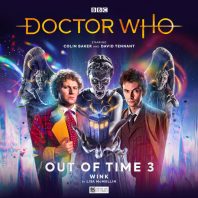
Released June 2022
SOME SPOILERS FOLLOW
The advertised Out of Time trilogy of multi-Doctor stories featuring David Tennant’s Tenth Doctor draws to a close with ‘Wink’ by Lisa McMullin featuring Colin Baker’s Sixth Doctor and the Weeping Angels.
‘Wink’ wastes little time bringing the two incarnations together upon the world of Lucidus Silvara, a place where nothing is normally visible except blinding light due to an abundance of stars but which is currently experiencing a twilight of sorts due to a perfect celestial alignment and resulting eclipse. The Doctors soon find a civilization that has evolved with intuition rather than sight as its fifth sense under such unique conditions, and the serendipitous reason a city has thrived while under the constant threat of the Weeping Angels that the people can perceive as nothing more than a concept is a brilliant means of re-establishing the core mechanics of this race. Of course, each successive story featuring the Angels has attempted to expand their mythology while staying true to what originally made them such a phenomenal success in ‘Blink,’ and by imbuing a far more antagonistic tone to the controlled Dax played so effectively by Clive Hayward as well as by highlighting the effects of having an undefended and unknowing group of prey and the presence of two iterations of the same Time Lord certainly manage to achieve those aims admirably. Through evocative and tense sound design that makes the Angels and cherubs wholly menacing alongside descriptive dialogue that flows naturally to aid the Doctors’ friends Padilla and Estra who have no concept of sight, ‘Wink’ is another strong example for Big Finish of this enemy that is seemingly reliant on its visual component making an equally effective audio threat.
Naturally, ‘Wink’ is just as reliant on the performances of David Tennant and Colin Baker as on the effectiveness of the Angels, and the two leads bring a tremendous amount of energy and chemistry that jointly emphasizes the very unique strengths and characteristics of these most verbose incarnations. Indeed, even with time disturbances seemingly interfering with the Tenth Doctor’s memories of his former self, the two quickly form a mutual respect and play off of each other surprisingly well. The Tenth Doctor is his usual exuberant self and is quick to take charge and to explain what he knows to anyone who will listen, sometimes to comedic effect when his former self is his only audience member who is quick to point out how talkative he truly is, and the Sixth Doctor is every bit as commanding while perhaps choosing his words a bit more carefully. True to form, the Sixth is all too proud of his common sense suggestion that people should simply wink to keep the Angels at bay rather than blink, and the Tenth quite astutely points out that this is easier said than done given that the Sixth fell victim to an Angel’s touch. Still, the good-natured banter that these two quickly establish highlights the inherent similarities between these two, and the Sixth Doctor somewhat surprisingly defers to his future self’s experience and knowledge while attempting to formulate a plan that will allow them to emerge victorious and avert the loss of any lives against a surprisingly large contingent of Angels. The rather unique use of the TARDIS to move the story along as well as the ultimate paradox that ensues are fairly overt plot conveniences, however, but they work within the context of this particular tale to deliver a logical conclusion that culminates with a poignant moment of genuine respect and fondness between the two.
Filled with iconic voices and imagery and in the end seemingly providing the Sixth Doctor with the impetus to consider a wardrobe change to blue, ‘Wink’ is filled with plenty of nods to both of its Doctors’ eras while lovingly emphasizing the incredible strengths and unique quirks of both incarnations. The pacing does perhaps move a little too quickly for everything McMullin attempts to include, but the strong supporting performances of Ayesha Antoine and Joanna Van Kempen help to fully flesh out this strong intersecting of eras that very much puts its focus on the characters and story rather than on a purely celebratory nature. If this is truly the end of Out of Time, this brief series of interludes has consistently delivered and gone out on an undoubted high note.
- Release Date: 6/2022
- Directed by: Ken Bentley
- Written by: Lisa McMullin


Leave a Reply